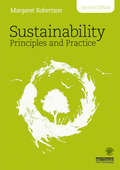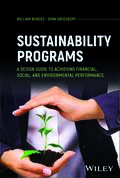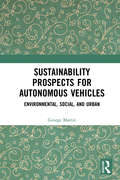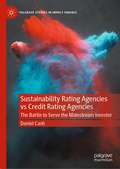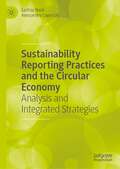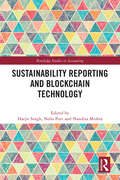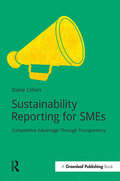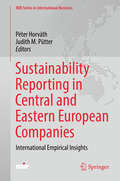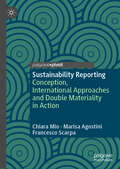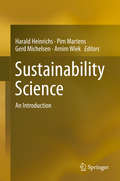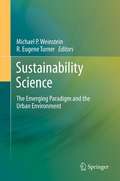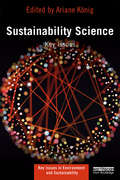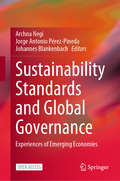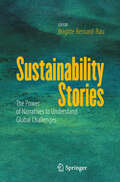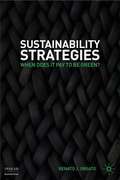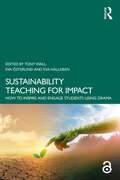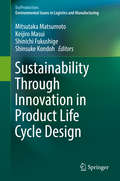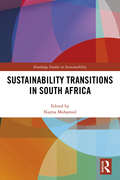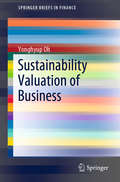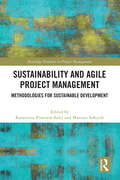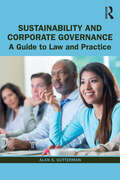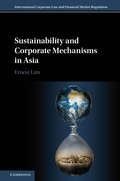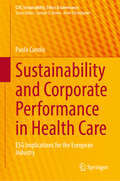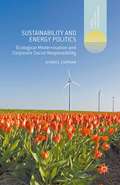- Table View
- List View
Sustainability Principles and Practice: Principles And Practice
by Margaret RobertsonSustainability Principles and Practicegives an accessible and comprehensive overview of the interdisciplinary field of sustainability. The focus is on furnishing solutions and equipping the student with both conceptual understanding and technical skills for the workplace. Each chapter explores one aspect of the field, first introducing relevant theory and presenting issues, then supplying tools for working toward solutions. Elements of sustainability are examined piece by piece, and wide coverage ranges over ecosystems, social equity, environmental justice, food, energy, product life cycles, cities, and more. Techniques for management and measurement as well as case studies from around the world are provided. Chapters include further reading, discussion questions, and problems to foster quantitative thinking. The book is supported by a companion website with key website links, detailed reading lists, glossary, and additional case studies, together with numerous projects, research problems, and group activities, all of which focus on real-world problem solving of sustainability issues. The textbook is designed to be used by undergraduate college and university students in sustainability degree programs and other programs in which sustainability is taught.
Sustainability Programs: A Design Guide to Achieving Financial, Social, and Environmental Performance
by William Borges John GrosskopfGo-to guidance for designing, implementing, and managing effective sustainability programs and their management systems Moving past vague concepts, buzzword overloads, superficial efforts, and flavor-of-the-month misdirections, Sustainability Programs presents a pragmatic, step-by-step approach to creating and managing adaptable, organization-wide sustainability programs to achieve People, Planet, and Profit (3P) objectives with least cost, effort, and risk. Key steps covered in this book include reaching a programmatic “Go” decision, developing sustainability policies, designing an organizational framework, defining the most pressing sustainability needs, and cascading 3P goals, tactics, targets, and initiatives into business units, functions, and departments to create new capabilities and improve performance. By following the principles and practices in this book, any organization can better achieve sustainability’s full promise of social responsibility, environmental stewardship, and financial performance. Written by authors with a wealth of practitioner experience in the field, Sustainability Programs explores topics including: Creating social, environmental, and financial strategies, tactics, targets, and initiatives that create new capabilities and resolve 3P performance issuesAvoiding ad hoc projects that fail to address critical sustainability issues, wasting valuable resources and squandering competitive advantagesOvercoming technical professionals’ lack of business management experience and helping management professionals understand sustainability’s benefits and intricaciesUnderstanding sustainability through the management lenses of risk reduction, improved efficiencies through eradication of wastes, increased revenues via innovation, and enhanced competitive advantages fueled by greenwash-free transparency.Responding to the demanding data capture, analysis, and reporting challenges of environmental, social, and governance (ESG). Acknowledging that one size does not fit all, this book delivers individual concepts and methods adaptable across any organization’s value chains. It is an essential read for leaders and practitioners working within private and public enterprises of all types and sizes, especially those with 2,000 to 5,000 employees.
Sustainability Prospects for Autonomous Vehicles: Environmental, Social, and Urban
by George T. MartinThe Autonomous Vehicle (AV) has been strongly heralded as the most exciting innovation in automobility for decades. Autonomous Vehicles are no longer an innovation of the future (seen only in science fiction) but are now being road-tested for use. And yet while the technical and economic success and possibilities of the AV have been widely debated, there has been a notable lack of discussion around the social, behavioural, and environmental implications. This book is the first to address these issues and to deeply consider the environmental and social sustainability outlook for the AV and how it will impact on communities. Environmental and social sustainability are goals unlike those of technical development (a new tool) and economic development (a new investment). The goal of sustainability is development of societies that live well and equitably within their ecological limits. Is it reasonable and desirable that only technical and economic success comprise the swelling AV parade, or should we be looking at the wider impacts on personal well-being, wider society, and the environment? The uptake for AVs looks to be lengthy, disjointed, and episodic, in large measure because it faces a range of known unknown risks. This book assesses the environmental and social sustainability potential for AVs based on their prospective energy use and their impacts on climate change, urban landscapes, public health, mobility inequalities, and individual and social well-being. It examines public attitudes about AV use and its risk of fostering a rebound effect that compromises potential sustainability gains. The book concludes with a discussion of critical issues involved in sustainable AV diffusion.
Sustainability Rating Agencies vs Credit Rating Agencies: The Battle to Serve the Mainstream Investor (Palgrave Studies in Impact Finance)
by Daniel CashThis book details the difference between the two rating industries, but this difference is converging all the time. The concept of investing in a more responsible and sustainable manner is drawing in some of the world’s leading investors and, with it, regulations and policies are developing at the highest levels. However, the market is not getting what it needs to fully submit to the concept of responsible investing. It has called for more to be done from those tasked with injecting information into their processes, and two industries in particular have been identified as being natural partners. It has been suggested that they are on a collision course to serve the mainstream investor, and in this book, that collision course is contextualised, explained, presented, and finally its outcome predicted.
Sustainability Reporting Practices and the Circular Economy: Analysis and Integrated Strategies
by Alessandro Capocchi Sarfraz NazirThe Circular Economy (CE) and CE-related approaches are increasingly prominent in corporate strategy, with potential environmental, social, and economic benefits to the organization. However, a comprehensive framework that incorporates CE with governance and reporting practices, providing accurate assessments of CE’s success in achieving sustainability targets and other goals, is not yet in place. This book addresses that gap, analyzing the relationship between CE and sustainable development practices, company performance, and to what extent organizations have disclosed this information in annual reporting practices. It proposes different frameworks to evaluate the environmental, social, and economic impact of CE and how CE might be promoted, disclosed, and accurately assessed in reporting practices. It will be of great interest to researchers and students of sustainable development, governance, accounting, and business economics, as well as practitioners seeking a research-based framework for integrating CE into their business reporting.
Sustainability Reporting and Blockchain Technology (Routledge Studies in Accounting)
by Harjit Singh Nandita Mishra Neha PuriThis book explores the much talked about but less understood issue of sustainability reporting, in a global context, linking it to the application of blockchain and other emerging technologies. It provides a transnational platform to examine the experiences of investors, researchers, academicians, and policymakers as they confront these concerns across a variety of industries and countries, thus offering best-practice guidance to assess the technological landscape and to model sustainable business initiatives. It offers relevant theoretical frameworks and the latest empirical research findings. Further, it argues that in order to reduce ‘carbon footprints’ globally, by reporting all their emissions through a single blockchain platform, companies can create a standardized space for data to be collected and tracked reliably, allowing for meaningful measurements.The book benchmarks and analyses sustainability performance with respect to numerous laws, norms, codes, performance standards, and voluntary initiatives. It demonstrates how the organization influences and is influenced by expectations about sustainable development and emphasizes the link between financial and non-financial performance, enabling external stakeholders to understand the organization’s true value, along with tangible and intangible assets. It will enable readers to increase their understanding of the potential risks and opportunities and avoid environmental, social, and governance failures.The book provides insight into existing research, practice, and outcomes that could clarify and promote the state of the art on themes such as the drivers for sustainability reporting, Environmental, Social, and Governance goals, the influence of blockchain on sustainability reporting as well as the issues and challenges. The book will be a useful guide for scholars, researchers, students, practitioners, regulators and policymakers alike.
Sustainability Reporting for SMEs: Competitive Advantage Through Transparency (Doshorts Ser.)
by Elaine CohenSustainability reporting can help companies make more money. Sustainability Reporting for SMEs shows you how. Reporting, done well, requires a company to make public a set of promises that bind the company to its sustainability commitments. By adopting a transparent approach to both business practice and reporting, SMES can gain significant business advantage, both in terms of more effective internal processes and in terms of reputation and business-building.Elaine Cohen provides guidance and tools for actual actions that will improve the sustainability impacts of your company, and a process for reporting that adds value which is much greater than the printed or online report itself. This book will help SMEs develop "the transparency habit" so that they both make more money and contribute more proactively to the sustainability of our society and planet.It is vital reading for SME owners and managers, entrepreneurs, business and sustainability students and teachers, and consultants. Sustainability managers in larger organisations will find this book helpful in assisting their organisations manage their supply chains which undoubtedly include several SMEs.
Sustainability Reporting in Central and Eastern European Companies: International Empirical Insights (MIR Series in International Business)
by Péter Horváth Judith M. PütterThis collection of expert articles highlights the standards and practices concerning sustainability reporting among companies in Central and Eastern Europe (CEE). Due to the growing interest in corporate social responsibility issues, sustainability reporting has become increasingly common among businesses that claim to adhere to certain social, environmental and economic standards. While it can be observed that sustainability reporting is widely practiced in Western and Northern European countries, only few studies have been conducted on this topic in the CEE region. Drawing on a major empirical study involving researchers from 10 different CEE countries, this book addresses the status quo of sustainability reporting, outlines future prospects and provides essential recommendations for practitioners.
Sustainability Reporting: Conception, International Approaches and Double Materiality in Action (Palgrave Studies in Impact Finance)
by Chiara Mio Marisa Agostini Francesco ScarpaThe book provides a comprehensive exploration of the the evolution in sustainability reporting and non-financial disclosure from three perspectives: regulatory, literary, and empirical. First, the book discusses the variety of frameworks and standards, normative sources, and regulatory initiatives aimed at promoting and standardizing sustainability reporting at the international level. Second, the book offers a systematic review of academic literature on sustainability reporting and non-financial disclosure. Third, the book examines the concept of materiality in sustainability reporting and provides an empirical analysis of the quantity and quality of materiality disclosures in sustainability reporting across the globe. The book concludes by discussing future directions for developments in sustainability reporting research and practice, and is relevant to academics, practitioners, and students interested in the intersection of sustainability, corporate reporting, and corporate finance.
Sustainability Science
by Pim Martens Gerd Michelsen Harald Heinrichs Arnim WiekThis textbook provides a comprehensive compilation of conceptual perspectives, methodological approaches and empirical insights of inter- and transdisciplinary sustainability science. Written by an international team of authors from leading sustainability institutions, the textbook covers key perspectives and topics of the scientific discourse on sustainable development. More than two decades after conceptualizing sustainability as societal guiding vision and regulative idea the necessity of concretizing and realizing sustainability in societal praxis is bigger than ever. Sharply improved individual and societal sustainable decision-making and action is necessary for a better future of humankind and the planet. On that account problem- and solution-oriented perspectives and competencies are crucial. The different chapters assemble an encompassing view of essential foundations and specific areas of research and action in sustainability science and practice. The textbook aims at fostering the further establishment of sustainability science in higher education and to enable the next generation of sustainability experts to tackle the challenging and exciting topic of sustainable development.
Sustainability Science
by Bert J. M. de VriesSustainable development is becoming the guiding principle for the twenty-first century. This textbook – based on the author's course and rigorously class-tested by his students – provides an introduction into patterns of past and present (un)sustainable development and into the emergence of the notion of sustainable development. It systematically surveys the key concepts, models and findings of the various scientific disciplines with respect to the major sustainability issues: energy, nature, agro-food and resource systems, and economic growth. System analysis and modelling is introduced and used as an integrating tool. Stories and worldviews are used to connect the quantitative and the qualitative and to offer the reader an understanding of relevant trends and events in context. Sustainability Science is an ideal textbook for advanced undergraduate and graduate level courses in sustainable development and in environmental and resource science and policy.
Sustainability Science
by R. Eugene Turner Michael P. WeinsteinThe object of this book is to highlight how the nascent field of sustainability science is addressing a key challenges for scientists; that is, understanding the workings of complex systems especially when humans are involved. A consistent thread in the sustainability science movement is the wide acknowledgement that greater degrees of integration across what are now segmented dimensions of extant Science and Technology systems will be a key factor in matching the most appropriate science and technology solutions to specific sustainability problems in specific places.
Sustainability Science: Key Issues (Key Issues in Environment and Sustainability)
by Jerome Ravetz Ariane König<p>Sustainability Science: Key Issues is a comprehensive textbook for undergraduates, postgraduates, and participants in executive trainings from any disciplinary background studying the theory and practice of sustainability science. Each chapter takes a critical and reflective stance on a key issue or method of sustainability science. Contributing authors offer perspectives from diverse disciplines, including physics, philosophy of science, agronomy, geography, and the learning sciences. <p>This book equips readers with a better understanding of how one might actively design, engage in, and guide collaborative processes for transforming human-environment-technology interactions, whilst embracing complexity, contingency, uncertainties, and contradictions emerging from diverse values and world views. Each reader of this book will thus have guidance on how to create and/or engage in similar initiatives or courses in their own context. <p>Sustainability Science: Key Issues is the ideal book for students and researchers engaged in problem and project based learning in sustainability science.</p>
Sustainability Standards and Global Governance: Experiences of Emerging Economies
by Archna Negi Jorge Antonio Pérez-Pineda Johannes BlankenbachThis open access book focuses on the issue of sustainability standards from the perspective of both global governance frameworks and emerging economies. It stems from the recognition that the accelerated pace of economic globalization has generated production and consumption patterns that are generating sustainability concerns. Sustainability standards (and regulations) are increasingly being used in a bid to make global consumption and production more sustainable. Given the dense inter-connectedness of economic affairs globally, the use of sustainability standards has become a concern of global governance, who face the challenge of achieving a balance between the use of standards for genuine sustainability objectives, and not allowing them to turn into instruments of protectionism or coercion.The emerging economies, given their increasing engagement with the global economy, are most impacted by the use of sustainability standards. The emphasis of ‘emerging economies’ in this book is retained both by using case studies from these economies and by collating perceptions and assessments of those located in these economies. The case studies included span sectors such as palm oil, forestry, food quality, vehicular emissions and water standards, and address the problems unique to the emerging economies, including capacity building for compliance with standards, adapting international standards in domestic contexts and addressing the exclusion of small and medium enterprises etc. Complex interfaces and dynamics of a global nature are not limited to the thematic of this book but also extend to the process through which it was written. This book brings together insights from developed as well as emerging economies (Germany, India, Mexico, Brazil, Indonesia, Pakistan, Mexico and China). It also brings together scholars and practitioners to jointly ponder upon the conceptual aspects of the global frameworks for sustainability standards. This book is a very useful resource for researchers and practitioners alike, and provides valuable insights for policy makers as well.
Sustainability Stories: The Power of Narratives to Understand Global Challenges
by Brigitte Bernard-Rau"Sustainability Stories" is an impactful book that offers a global perspective on the grand theme of sustainability. Through the lens of practitioners deeply committed to this cause, the book amplifies sometimes unheard voices, inspiring readers from diverse backgrounds to embrace environmental, social, and financial responsibilities. Each contributor, whether an entrepreneur, professor, lawyer, artist, or sustainability expert, acts as a visionary communicator, forging connections and leading by example. Featuring over 30 narratives from countries such as France, Germany, India, Morocco, Spain, Switzerland, and the United States, "Sustainability Stories" is sure to engage an international audience. Through its pages, this book spreads optimism, determination, and a desire for positive societal change. It empowers readers of all ages and educational backgrounds to join the movement toward a sustainable future. By sharing unique insights and experiences, "Sustainability Stories" serves as a catalyst, inspiring individuals to take action and make a difference in their professional practices, communities and lives.
Sustainability Strategies
by Renato J. OrsatoThe request on managers to base eco-investments on solid grounds has never been so vital. They need to know what they should do first, and why. Should they focus on generating carbon credits via eco-efficiencies? Enhance corporate reputation by joining Green Clubs? Subscribe to eco-label programs? Explore emerging cleantech markets? Within the overwhelming possibilities, many spend precious resources without sound criteria. By analyzing the rationales for sustainability strategies, this book addresses a timely question for managers, academics and MBAs: “when does it pay to be green?” Based on solid theoretical foundations and empirical research, it clarifies the elements involved in the formation and evaluation of sustainability strategies in firms, helping managers to prioritize eco-investments and transform them into sources of competitive advantage and new market spaces. Sustainability Strategies delves particularly deep into the troublesome global auto industry. By identifying the roots of economic and environmental problems of the sector, the book shows how to develop Sustainable Value Innovation: the creation of differential value for customers and contribution to society at both, reduced costs and environmental impacts.
Sustainability Teaching for Impact: How to Inspire and Engage Students Using Drama
by Tony Wall Eva Österlind Eva HallgrenSustainability Teaching for Impact is an essential step-by-step, practical guide for those wanting to inspire and engage higher education students in the areas of sustainability.This book encourages new and experienced university teachers across disciplines to adopt and adapt dramatic methods, with a view to develop their teaching. It introduces applied drama and performance arts methods that have been tried-and-tested across disciplines to deepen and broaden sustainability knowledge, skills, mindsets, and practices. Sustainability Teaching for Impact assumes no previous experience of the methods, as university teachers – with and without experience in drama – carefully walk you through some of the teaching practices they have used to create an impact in their teaching.This book is for higher and further education tutors who wish to build on their experience and deliver exciting and accessible classroom techniques and practices that are highly interactive, creative, and engaging to help further the teaching of sustainability.The Open Access version of this book, available at www.taylorfrancis.com, has been made available under a Creative Commons Creative Commons Attribution (CC-BY) 4.0 license.
Sustainability Through Innovation in Product Life Cycle Design
by Mitsutaka Matsumoto Keijiro Masui Shinichi Fukushige Shinsuke KondohThis book consists of chapters based on selected papers presented at the EcoDesign2015 symposium (9th International Symposium on Environmentally Conscious Design and Inverse Manufacturing). The symposium, taking place in Tokyo in December 2015, has been leading the research and practices of eco-design of products and product-related services since it was first held in 1999. The proceedings of EcoDesign2011 were also published by Springer. Eco-design of products and product-related services (or product life cycle design) are indispensable to realize the circular economy and to increase resource efficiencies of our society. This book covers the state of the art of the research and the practices in eco-design, which are necessary in both developed and developing countries. The chapters of the book, all of which were peer-reviewed, have been contributed by authors from around the world, especially from East Asia, Europe, and Southeast Asia. The features of the book include (1) coverage of the latest topics in the field, e. g. , global eco-design management, data usage in eco-design, and social perspectives in eco-design; (2) an increased number of authors from Southeast Asian countries, with a greater emphasis on eco-design in emerging economies; (3) high-quality manuscripts, with the number of chapters less than half of that of the previous book.
Sustainability Transitions in South Africa (Routledge Studies in Sustainability)
by Najma MohamedSouth Africa’s transition to a greener economy features prominently in the long-term development vision of the country, and is an integral part of the country’s national climate change response strategy. Despite significant gains in socio-economic development since its transition to democracy, the country continues to face the triple challenges of rising unemployment, income inequality and poverty – amid a slowdown in economic growth. Sustainability transitions offer new ways of shifting the trajectory of South Africa’s resource-intensive economy towards low-carbon pathways linked to the country’s transformative development agenda. Calls for inclusive approaches to greening the South African economy, which addresses the most vulnerable in society and ensures that the benefits of sustainability innovations reach all South Africans, are becoming more pronounced as sustainable development policy reforms are being implemented. The question that should be placed centre stage in South Africa’s sustainability discourse is whether notions of justice and inclusivity are being sufficiently addressed in the design and implementation of policy and programme interventions. This book explores South Africa’s sustainability transition through reflections on critical policy, economic, technological, social and environmental drivers. It provides a synthesis of theoretical insights, including new models and concepts, and praxis through illustrations from South Africa’s growing landscape of sustainable development policies and programmes. Finally, it assesses whether these transition pathways are beginning to reconfigure the system-level structures hindering the country’s goal of ‘ensuring environmental sustainability and an equitable transition to a low-carbon economy’.
Sustainability Valuation of Business (SpringerBriefs in Finance)
by Yonghyup OhThis book discusses the concept of sustainability valuation, a method in which corporate social responsibility (CSR) among other factors is embedded in the cash value of a given firm. It proposes a new, holistic way of representing sustainability in a theoretical framework, and discusses the role of policy in determining a firm’s cash value. Moreover, it addresses the method’s potential, the challenges involved in its practical application, and how it can be adapted to specific cases. By shaking up the field of firm valuation in an era characterized by global sustainable development, the book makes a valuable contribution to the available literature on finance, sustainability science, and policymaking.
Sustainability and Agile Project Management: Methodologies for Sustainable Development (ISSN)
by Mariusz Sołtysik Katarzyna Piwowar-SulejSustainable project management is a new school of management thought and a growing trend yet there is a scarcity of research on the linkage between individual PM methodologies and sustainability in projects. This book fills a gap through the theoretical and empirical research on the implications of sustainability in project management and, in particular, agile project management.The book explores three main themes. Firstly, it identifies and assesses the validity of the application of the concepts of sustainable development in the family of agile methodological frameworks. Secondly, the research results are presented as an introduction to further in-depth research on the future relationships between sustainable development and agile project management. Thirdly, the book identifies the competencies that are needed to successful implement projects in the context of sustainable development.Sustainability and Agile Project Management will be of direct appeal to academics and scholars in the management sciences, including project management, corporate governance and human resource management.
Sustainability and Corporate Governance: A Guide to Law and Practice
by Alan S. GuttermanSustainability and Corporate Governance is the first extensive and targeted guide for directors and their legal advisors on creating a governance framework for corporations that integrates all the recognized principles of sustainability now being discussed in boardrooms all over the world. The book provides a step-by-step approach on integrating sustainability principles into the activities of the board of directors including detailed guidance on legal, regulatory and business aspects of organizing and operating board committees and designing the sustainability management unit. Essential topics covered include: • Elements of an effective framework for implementation of sustainability governance, including required policies, procedures and committee charters • Organization of the governing board to effectively address sustainability issues and implement sustainability strategies • Best practices and processes to engage company stakeholders Corporate board members and attorneys will appreciate the book’s practical forms and checklists, complete coverage of all facets of sustainability governance, summaries of relevant international and national guidelines and instruments, and a curated list of samples and case studies from companies all around the world.
Sustainability and Corporate Mechanisms in Asia (International Corporate Law and Financial Market Regulation)
by Ernest LimThis is the first book to provide a comparative and critical analysis of why and how six corporate mechanisms - (1) sustainability reporting; (2) board gender diversity; (3) constituency directors; (4) stewardship codes; (5) directors' duty to act in the company's best interests; and (6) liability on companies, shareholders and directors - have been or can be used to promote sustainability in the four leading common law jurisdictions in Asia (Singapore, Hong Kong, India and Malaysia). A central challenge is, whether and if so, how the corporate mechanisms should be reconceptualised to promote sustainability in an environment that is characterised by controlling shareholders, particularly the government in state-owned enterprises. Because controlling shareholders are the norm for the majority of the world's companies, and state-owned enterprises play a significant role, this book has important insights on the problems and prospects of advancing sustainability in concentrated and mixed ownership jurisdictions.
Sustainability and Corporate Performance in Health Care: ESG Implications for the European Industry (CSR, Sustainability, Ethics & Governance)
by Paolo CandioThis book explores the multifaceted relationship between sustainability and corporate performance in health care by providing a review of the relevant policy and academic literature, together with novel quantitative evidence to support strategic and managerial decision-making. The book uniquely investigates whether and how improvements in sustainability-related activities and reporting, and respective ESG scores assigned by international rating agencies, are related to corporations’ economic and market performance. The potential development and expansion in private health care services and products, accelerated by the COVID-19 pandemic, calls for a new paradigm in the health care industry. After introducing the reader to the social and policy context for sustainable development and to various normative and market instruments used to assess sustainability and corporate performance, the book presents the results of statistical analyses conducted on a representative sample of top health care companies listed in European capital markets and draws conclusions about the profitability and effectiveness of sustainability- and ESG-related investments. There’s a current debate about whether investing in sustainability not only fulfills ethical obligations but also drives long-term value. The empirical literature often presents conflicting findings, particularly when it comes to scholars’ relatively limited evaluation of the health care industry. The book sheds new light on this proposition and offers guidance on sustainable decision-making in health care, making it relevant for researchers and professionals.
Sustainability and Energy Politics: Ecological Modernisation and Corporate Social Responsibility (Energy, Climate and the Environment)
by Giorel CurranThe author explores the fraught politics of energy transitions in an age of climate change. She does so through an ecological modernisation and corporate social responsibility lens which she contends shapes and underpins sustainability today. Case studies cover climate policy, unconventional gas and renewable energy.
